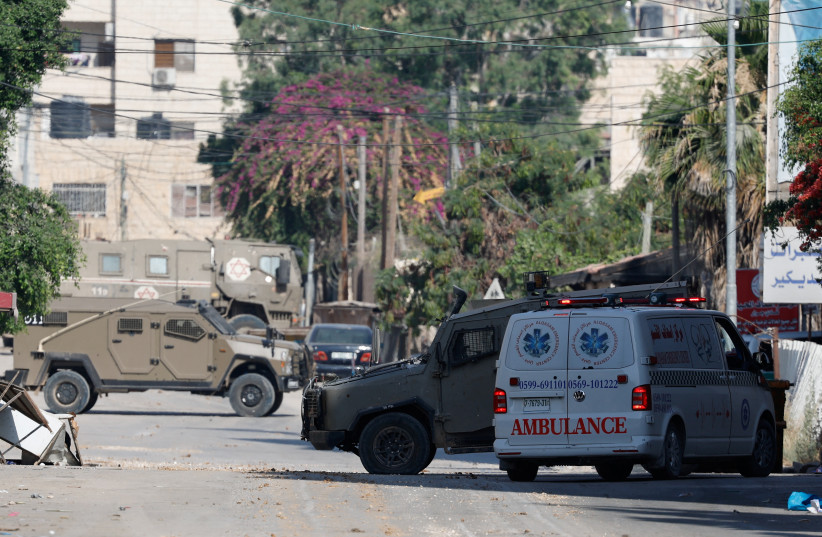IDF reveals to ‘Post’ three incidents involving Palestinian detainees tied to IDF jeep hoods
With two new incidents confirmed along with an original incident from last week in which IDF soldiers have tied Palestinian detainees to jeep hoods, it is unclear whether the military has gotten a full hold on the issue.
Last week, the IDF admitted that a Palestinian resident of Jenin, Mujahed Azmi, had been tied to a jeep hood and had condemned the soldiers involved, opened a criminal probe, and sought to present the episode as an isolated incident.
However, the IDF has now admitted to The Jerusalem Post that at least two other incidents, revealed first by the BBC on Sunday, of tying West Bank Palestinians detainees to car hoods have occurred recently.
Further, the IDF is not 100% sure that the tactic has been completely rooted out of its culture, though it is making efforts to do so.
The other two men are Samir Dabaya, 25, and Hesham Isleit, both of Jabariyat near Jenin.

One factor which could weigh against the IDF forces involved in the operation last week, but in favor of IDF forces eliminating the tactic in the future, is that the newly revealed cases are not actually new.
In other words, it appears that they occurred on the same day last week as the first case, and were only disclosed on a delay of several days.
In that sense, no recurrence of the tactic has happened since the first incident was blown open in the media and investigated by the IDF.
At the same time, the IDF did not respond with any public statement to an inquiry about the two new cases, making it unclear if they are being treated as seriously as the first incident.
One man who was tied to jeep hood talks to the BBC
Dabaya told the BBC that he was shot by IDF troops and left lying on the ground for hours until soldiers came to assess his status.
Next, he said that the soldiers beat him when they realized he was alive and threw him onto the hood of their jeep.
Likewise, Isleit was shot in the leg, likely by the IDF, and then threatened with being killed if he did not climb onto the jeep hood.
It was unclear from both the IDF and the BBC whether the detainees were suspects or whether they had just been caught up in a broader battle between the IDF and various suspects.
At least one of the detainees admitted having been staying in a residence with one of the suspects the IDF was pursuing, though he denied any connection to violence or terrorism.
The original incident in Jenin from last week came to light when a video circulated on social media showed Azmi, of Jenin, tied on to the jeep that passes through two ambulances.
The Israeli military in a statement last week about the Azmi incident said Israeli forces were fired at and exchanged fire, wounding a suspect and apprehending him.
Soldiers then violated military protocol, the statement said. “The suspect was taken by the forces while tied on top of a vehicle,” it said.
The military said the “conduct of the forces in the video of the incident does not conform to the values” of the Israeli military and that the incident will be investigated and dealt with.
The individual was transferred to medics for treatment, the military said.
IDF sources told the Post that the soldiers tried to hand the Palestinian over to the Red Crescent, but that the Red Crescent ambulance had no space.
Given that the soldiers also did not have an additional seat for a wounded captive, they thought getting him to the hospital, even tied to the hood of the car, was better than other options.
Reuters was able to match the location from corroborating and verified footage shared on social media that shows a vehicle transporting an individual tied on top of a vehicle in Jenin. The date was confirmed by an eyewitness interviewed by Reuters.
According to the family of Azmi, there was an arrest raid, and he was injured during the raid, and when the family asked for an ambulance, the army took Mujahed, strapped him on the hood and drove off.
All three men were released by the IDF with no public explanation of why they had been detained or why they were then released.
Since October 7, human rights groups have accused Israel of killing over 500 Palestinians in the West Bank, but have not differentiated between combatants and innocent civilians, though they say that more than 100 were minors.
Meanwhile, the IDF and the Shin Bet have arrested over 4,100 Palestinian suspects, over half of whom are formally connected to Hamas or Islamic Jihad.
The security forces say that without constant raids, the West Bank tinderbox could have led to a wave of additional terror against israelis.
As things stand, the security forces have not managed to prevent all terror attacks from Palestinians from the West Bank, and there continue to be periodic incidents.
In addition, a wave of terror from the West Bank started back in March 2022 and has never really been extinguished fully since then.





Comments are closed.